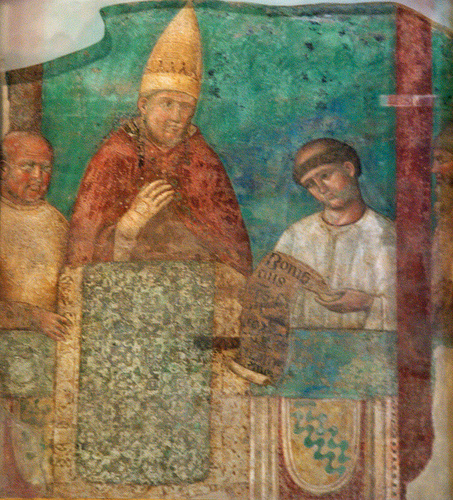In Montpellier during those same years, Arnau de Vilanova wrote his first theological works influenced by the ideas of the reformist currents – the spiritual Franciscans led by Pèire Joan Oliu – with which he began to enter into contact, and spurred by a profound religious experience.
Since at least 1297, even though he lived in Montpellier, Arnau de Vilanova became the physician to Jaume II, and after his wedding to Blanche of Anjou, he also cared for her health and that of their children. Later the king made Arnau his advisor and entrusted him on several missions. Thus, in 1299 he sent Arnau to Paris to negotiate with Philippe the Fair for the return of the Val d’Aran. Arnau de Vilanova took advantage of his stay in Paris to share his apocalyptic ideas at the Faculty of Theology, and he was denounced by the theologians before the Ordinary. In consequence, an inquisitorial trial was started against him, and Arnau de Vilanova had to spend a few days in prison. He was only allowed free after paying a high bail. The events in Paris would mark the forthcoming years in his life. In 1301, Arnau went to the Papal Court in Anagni, and the inquisitorial trial was finally halted by Pope Boniface VIII. He reproved Arnau de Vilanova’s work, arrested him and made him abjure them, but he also mitigated the seriousness of Arnau’s apocalyptic propositions by claiming that they were mere academic speculations (dicta scholastica). He was advised to devote his life to medicine, not to theology. In fact, Pope Boniface VIII suffered from gallstones so he had a keen interest in Arnau de Vilanova’s medical knowledge. He became the pope’s chief physician and relieved him of his illness with a treatment which included an astrological seal and which was given to him in a written leaflet that is lost today.
The events of Paris are just the first skirmishes in a controversy which would last until 1305. Numerous professors from Paris reacted in favour (such as Jean Quidort) or against (Pèire Cros) Arnau de Vilanova’s proclamations of the imminent coming of the Antichrist. After the theologians of Paris, the Dominicans would take the initiative, including Bernat de Puigcercós (Girona, 1302-1303), Joan Vigorós (Marseille, 1304) and Martín de Ateca (Barcelona, 1304-1305). They exchanged all sorts of works, denunciations and counter-denunciations with Arnau de Vilanova, which they submitted to the Church authorities. For Arnau, these were years of upheaval, restlessness and fear. To avoid blasphemy or tergiversations of his statements, he publicly confessed his beliefs before the bishops and abbots of the Tarraconense (Lleida, 1303) and King Jaume II (Barcelona, 1305) and presented his works to Popes Benedict XI and Clement V. The controversy ended (at least temporarily; after Arnau’s death it resumed) when Arnau de Vilanova presented all his works de evangelica veritate written until 1305 to the pope, and Clement V closed himself in the Holy See to study and examine them. The fact that King Jaume II took Arnau de Vilanova’s side is proven by the fact that when the inquisitor of Valencia, Guillem de Cotlliure, excommunicated Gombau de Piles for possessing books by Arnau de Vilanova, the king declared that he owned them as well and even read them.
